Top 5 Newman articles
Following Leo XIV’s attempted naming of Newman as a Doctor of the Church, check out The WM Review’s top five articles on the famous English Cardinal.

Following Leo XIV’s attempted naming of Newman as a Doctor of the Church, check out The WM Review’s top five articles on the famous English Cardinal.
(WM Round-Up) – On 1 November 2025, Leo XIV declared Newman to be a Doctor of the Church – at least, of the “Conciliar/Synodal Church” of which he is the current president.
Over the years, The WM Review has spent a lot of time writing about the English Cardinal, John Henry Newman – providing texts from his works, presenting his thought, and wading through the claims of “The Anti-Newman Legend.”
Notwithstanding what we hold about both Leo XIV and this act, we have used the occasion to present a curated selection of our favourite articles on Cardinal Newman, followed by a few book recommendations.
But before we start:
What better way to celebrate Leo XIV’s attempt to name Cardinal Newman a Doctor of the Church than with this lovely Newman mug?
We’re offering special discount on this one in honour of the Cardinal:
Top Five Newman Articles
1. Newman’s ‘toast to conscience’
Everything you’ve heard about Newman’s ‘toast to conscience’ is probably wrong

Probably about everything which most people think or have been told about Cardinal Newman’s famous toast “to conscience first, and to the Pope afterwards” is wrong.
We consider this article to be a real contribution to the study of Newman’s work, as we have not seen any other writer mention this wider controversy and its importance.
With the passing of time, the context of Newman’s comment has been all but completely lost, such that almost everybody draws the wrong conclusions about what Newman meant.
It is like we have heard one side of a telephone conversation, and completely misunderstood the topic.
However, Newman’s critics consider the comment a sign of heterodoxy, and most of his conservative defenders try to explain it in a way that makes little sense in the context of the chapter and work – let alone Catholic theology.
But once the actual context – of a wider contemporary debate about after-dinner toasts – is understood, everything becomes clearer. Unlikely though it may seem to those unaware of the contemporary debates, Newman’s comment emerges as a striking affirmation of Newman’s loyalty to the papacy.
Perhaps Newman’s work should have included more context, such that this misunderstanding could have been avoided: but perhaps the same will be said in a century about any one of us engaged in writing today.
Here is the article, giving an overview of the controversy, what was at stake, and how Newman’s comment was resolute indication of choosing a side:
And here is a related text from the controversy itself, published in 1859:
2. Newman and the Heretic Pope question
Newman would be the fourth ‘ipso facto loss of office’ Doctor of the Church
Today, Cardinal Newman is routinely co-opted by those who wish to “rethink the papacy,” and enlist him as an ally in the cause of “papal minimalism.” This is perhaps one of the reasons that some, who understand the true nature of the papacy, are hostile towards the late Cardinal.
But whether this view of Newman is accurate or not, it is a fundamentally different question to whether a Pope can be a heretic or not – and the status of a putative Pope who is a heretic.
And in fact, Newman is yet another voice who publicly endorse what has come to be known as the “fifth opinion” on the Pope Heretic question.
If Newman really were to be a Doctor of the Church, this would make him the fourth Doctor who has expressed this conclusion in his writings – which is to say nothing of the other saints and theologians who took the same view.
While theology is not a numbers game, we are compelled to ask: How many doctors and saints do those who oppose this opinion have in their corner?
Nor is this the only matter in which Newman’s writings give expression to important and unpopular ideas in the current crisis in the Church. From his treatment of convergent arguments and his condemnation of religious liberty, to his treatment of Anglican Orders, Newman is resolute on the side of the “traditionalists,” and those who consider the Holy See to have been vacant since Vatican II.
Cardinal Newman and the validity of Holy Orders—What would he think today?
Cardinal Newman on Anglican orders—applied to Novus Ordo orders
St Gregory Nazianzen and the Crisis in the Church – Cardinal Newman
3. Newman and Converts
Should converts set themselves up as teachers? Newman’s answer
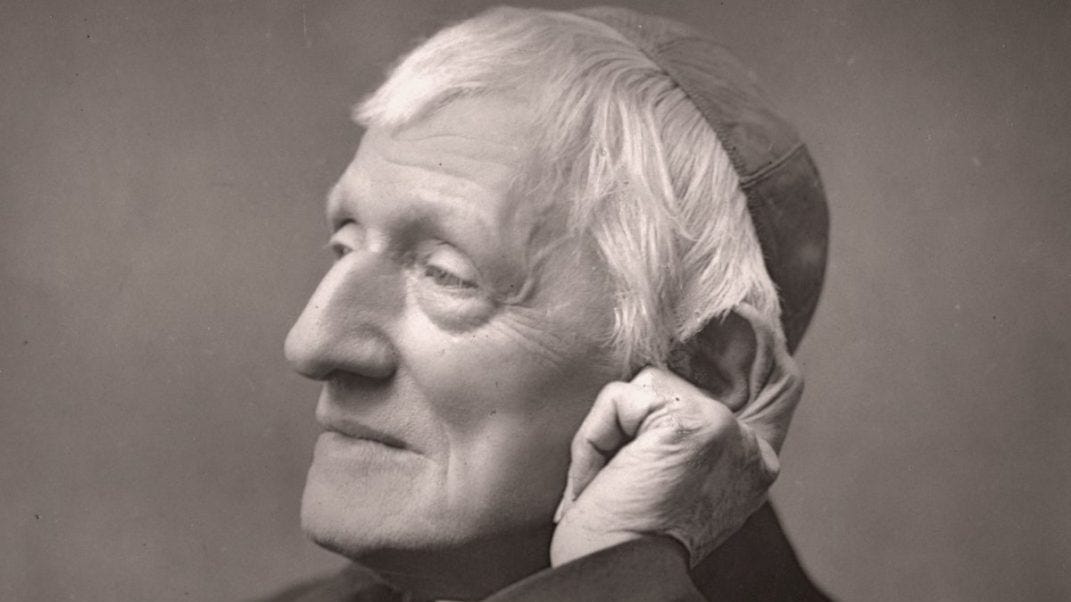
The Catholic Church is a body of converts. Whether we convert later in life, or are baptised as infants, we have all been snatched from the Kingdom of Satan and brought into the Kingdom of God.
However, this does not mean that it is wise for every Catholic to speak out on every issue immediately after their conversion. There is a process of development and maturing in the faith.
The modern Catholic internet scene is dominated by newly-converted Catholics, who see fit to promote their views in an aggressive and often uncharitable manner – all the while accusing others of a lack of charity.
While not doubting the sincerity of their search for truth, we must question whether they are in a position to condemn or criticise others.
Newman himself addressed this matter in his Letter to Pusey, written twenty years after his own reception into the Church, he explains how a convert should act on and after his reception into the Church, and how his contribution to the Church might change and develop as time goes on.
Incidentally, some have critiqued Newman for the particular work in question – both at the time, and in recent years. However, his own ordinary, Bishop Bernard Ullathorne – whose orthodoxy nobody questions – defended him in powerful terms at the time, and thoroughly destroyed those who used this book to question Newman’s faith, piety and attachment to Rome:
And one final related topic to the linked article – Newman’s takedown of the Victorian equivalent of YouTube televangelists:
4. Newman and ‘The Anti-Newman Legend’
Is Cardinal Newman’s idea of conscience ‘precisely modernist,’ as Bishop Sanborn claims?
We have written at length about ‘The Anti-Newman Legend,” which seeks to vilify John Henry Cardinal Newman in a way that is excessive and unjust. He is accused of unsoundness and condemned for alleged crimes and faults, some of which are overlooked or excused in other churchmen.
The problem with this narrative is not that it invents criticism where none existed, but that it inflates the charge-sheet, underestimates the nuance with which the criticisms were normally made, and deflates the respect that the Popes, churchmen and Catholic theologians actually showed to Newman – as well as the nuance with which criticisms have been historically made.
In 2023, Bishop Donald Sanborn, of Most Holy Trinity Seminary and the Roman Catholic Institute, levelled a series of very harsh accusations against Cardinal Newman. In response, we published a three-part series which demonstrated the falsehood of these long-standing “tribal myths” about Newman.
We later revised this three-part series into four shorter parts:
Is Cardinal Newman’s idea of conscience ‘precisely modernist,’ as Bishop Sanborn claims?
Bishop Sanborn, and Cardinal Newman’s ‘Proof from Conscience’
‘Aboriginal Vicar of Christ’ – Answering Bishop Sanborn’s accusations against Cardinal Newman
Bishop Sanborn’s attempt to link Cardinal Newman with Baron von Hügel
A few months after publishing this series, Bishop Sanborn appeared to walk back on or moderate some of his claims. However, following Leo XIV’s announcement that he would be declaring Newman as a Doctor of the Church, His Excellency regrettably renewed and expanded his list of accusations. In response, we published a chapter from Fr Edmond D. Benard’s book A Preface to Newman’s Theology, which could serve as a fifth part in this series:
However, “The Anti-Newman Legend” is a much wider phenomenon.
Part of the legend is that Newman was systematically accused of heresy, attacked, condemned and refuted by the most orthodox and faithful Catholics of his day, including other cardinals and prestigious theologians.
That’s why we have been working systematically through these treatments of Newman, and uncovering the reality of what was said, and by whom. Needless to say, the picture that emerges is quite different to that of “The Anti-Newman Legend.”
Orestes Brownson is not a credible critic of John Henry Newman
Cardinal Newman critiqued: How Cardinal Lépicier went about it
Did Cardinal Manning really accuse Cardinal Newman of ‘ten distinct heresies’?
As we can see in some of the articles above (particularly the latter), “The Anti-Newman Myth” derives much of its strength from Protestant, Modernist and Masonic sources – and is best refuted by Catholic sources.
5. Newman, Anti-Modernist
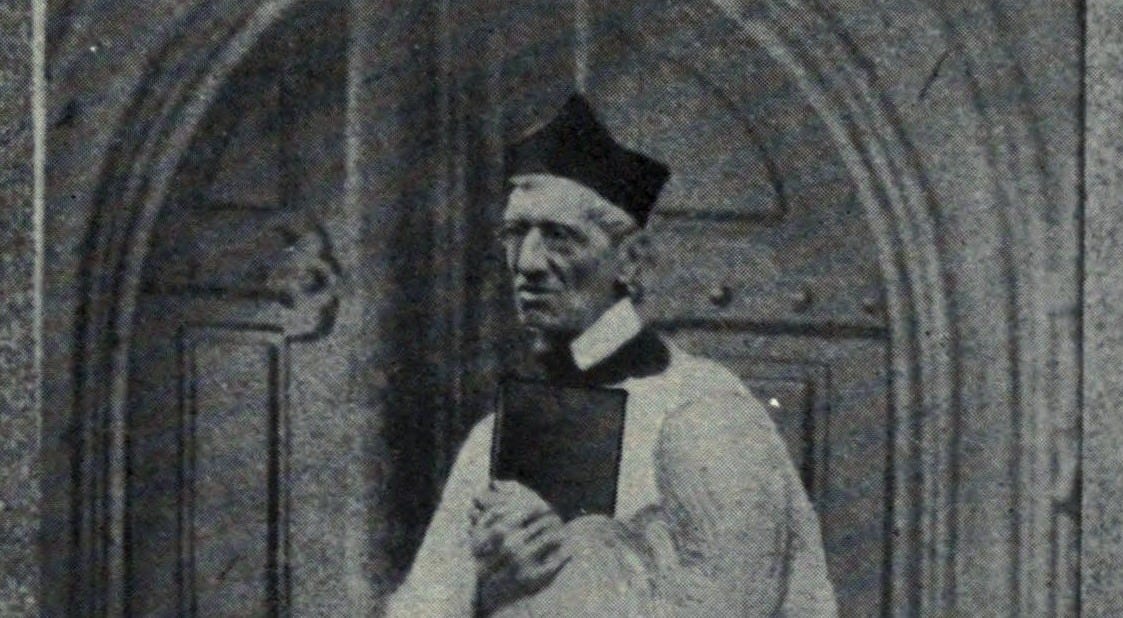
We have already seen Newman’s clear profession of the Catholic faith and of good sense, and the bankruptcy of “The Anti-Newman Myth.”
But there is one final point we need to recognise:
Fifty years before Pascendi Dominici Gregis – the encyclical on modernism, by Pope St Pius X – Newman exposed and condemned the incipient modernist errors, in The Idea of a University.
The classic work from which the the discourse is taken deals with the nature of university education. It is naturally not as systematic an exposition as St Pius X’s Encyclical. Nonetheless, it remains a perceptive analysis of early modernism – and an insight into Newman’s own thoughts on the matter.
Newman’s diagnosis is made in words very similar to those used in both Pascendi and the Anti-Modernist Oath, which rejected the error that faith is “a blind sentiment of religion welling up from the depths of the subconscious” rather than “a genuine assent of the intellect to truth received by hearing from an external source”.
Newman even quotes and critiques the lengthy prayer of a certain proto-modernist, which addresses God as the “Grand Architect” – suggesting a link between the ideas of modernism and the ideology of freemasonry.
We published this discourse in three parts.
It is remarkable that, in spite of all this, Newman is today accused by those who have not read his works of being a liberal.
Pope St Pius X wrote against those who twisted Newman’s words and used him as a cover for their errors: did he ever suspect that the future defenders of Catholic tradition would believe these lies – or even be the ones doing the twisting?
BONUS ARTICLE: Newman, Doctor of the Church?
Newman, Doctor of the Church? McCusker’s interview with Kokx News
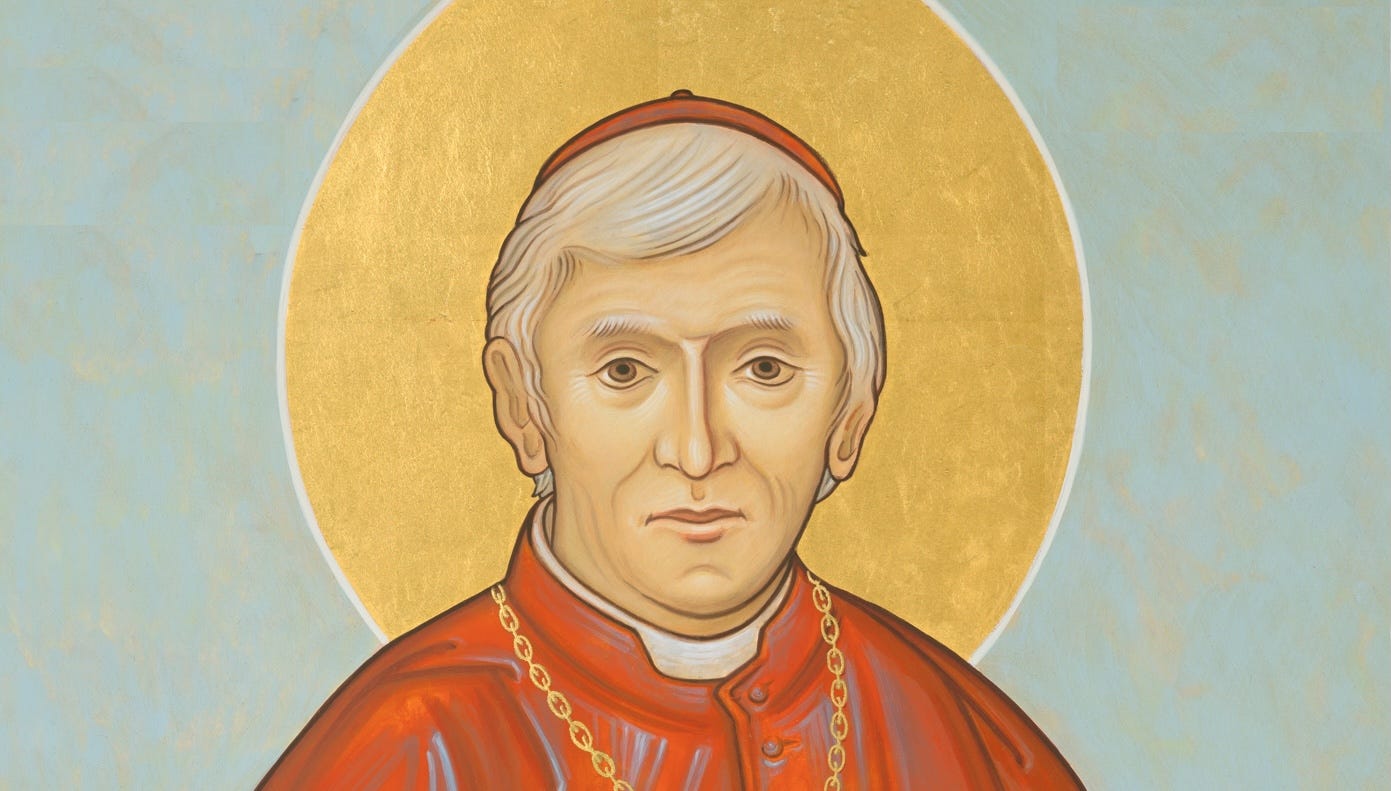
When Leo XIV’s intention was announced, WM Review editor Matthew McCusker was interviewed by Stephen Kokx of Kokx News on the subject.
You can read that interview here:
Best of the Rest
As usual, this “Top 5” contained rather more than five articles.
We have written and published many other articles about Newman over the years, whether presenting his sermons and spiritual subjects, or considering his encouragement for an educated laity.
These articles are available in our Newman Archive, and some are linked below:
What did Cardinal Newman say about the Rosary to a school of young men and boys?
The Immaculate Conception for non-Catholics—Cardinal Newman explains
Why it’s fitting that the month of May is dedicated to Our Lady
Two final articles in which Newman’s thought plays a significant role:
Pope Leo XIII – On the Duties of Laymen to Study and Spread the Faith
We must tell the full truth about the Pope Question: here’s why
Some recommended Books
Aside from Newman’s own works, the following are useful in approaching the subject for the first time:
Bishop E.T. O’Dwyer – Cardinal Newman and the Encyclical Pascendi Dominici Gregis
Fr E.D. Benard – A Preface to Newman’s Theology
C. Michael Shea – Newman’s Early Roman Catholic Legacy, 1845-1854
What better way to celebrate Leo XIV’s attempt to name Cardinal Newman a Doctor of the Church than with this lovely Newman mug?
We’re offering special discount on this one in honour of the Cardinal:
HELP KEEP THE WM REVIEW ONLINE WITH WM+!
As we expand The WM Review we would like to keep providing free articles for everyone.
Our work takes a lot of time and effort to produce. If you have benefitted from it please do consider supporting us financially.
A subscription gets you access to our exclusive WM+ material, and helps ensure that we can keep writing and sharing free material for all.
You can see what readers are saying over at our Testimonials page.
(We make our WM+ material freely available to clergy, priests and seminarians upon request. Please subscribe and reply to the email if this applies to you.)
Subscribe to WM+ now to make sure you always receive our material. Thank you!
Follow on Twitter, YouTube and Telegram:
Twitter (The WM Review)


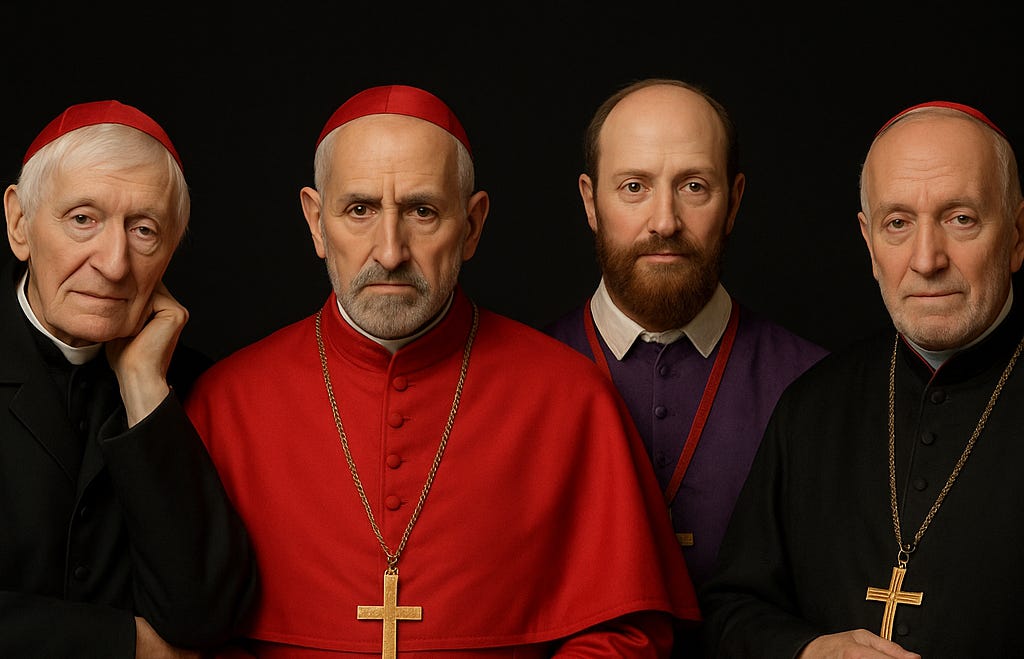
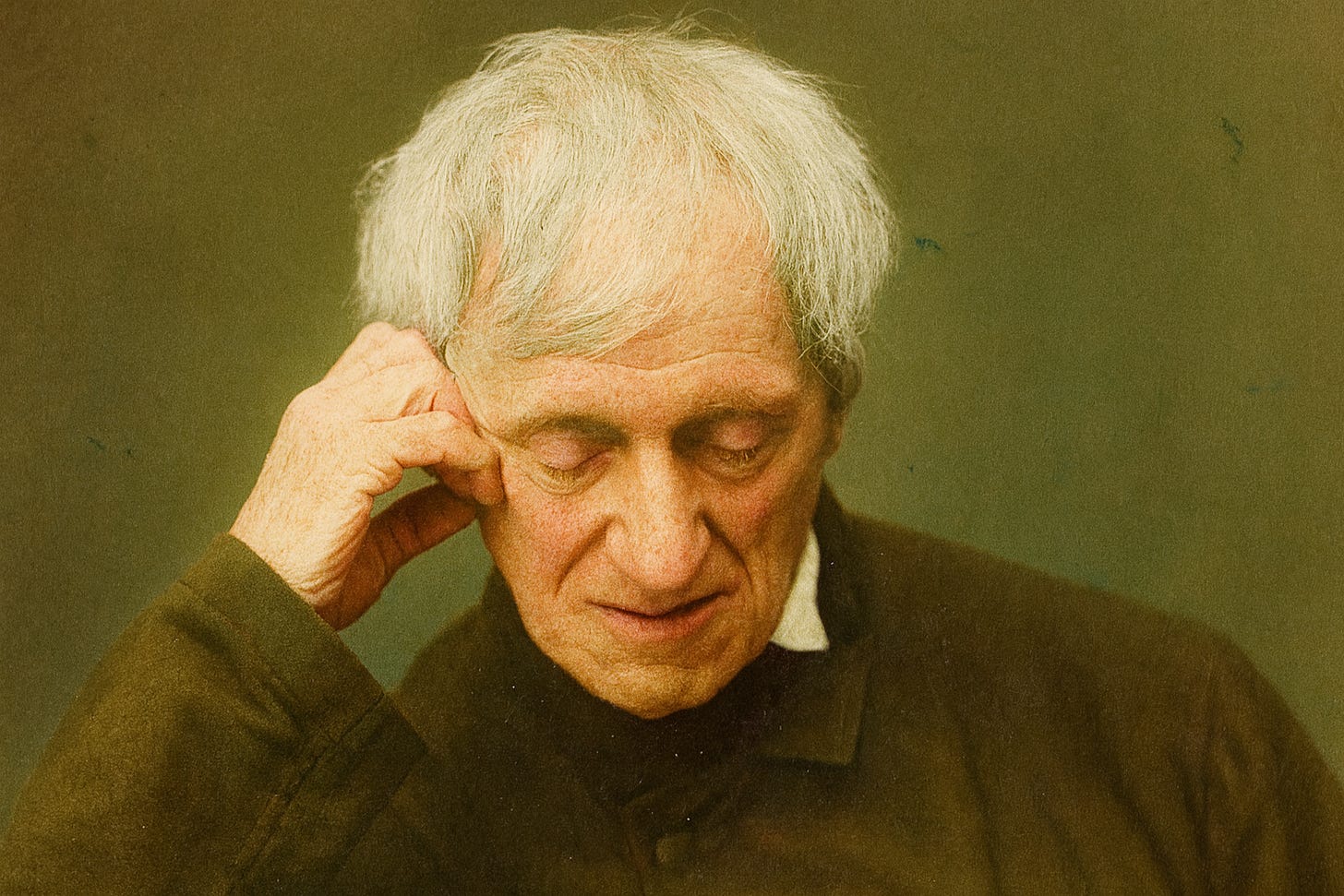
I think Fr. Reginald Garrigou-Lagrange O.P. deserves to be declared a Doctor of the Church also.
This is my favorite writing of Newman's, from the Apologia Pro Vita Sua:
...The sight of the world is nothing else than the prophet's scroll, full of "lamentations, and mourning, and woe."
To consider the world in its length and breadth, its various history, the many races of man, their starts, their fortunes, their mutual alienation, their conflicts; and then their ways, habits, governments, forms of worship; their enterprises, their aimless courses, their random achievements and acquirements, the impotent conclusion of long-standing facts, the tokens so faint and broken of a superintending design, the blind evolution of what turn out to be great powers or truths, the progress of things, as if from unreasoning elements, not towards final causes, the greatness and littleness of man, his far-reaching aims, his short duration, the curtain hung over his futurity, the disappointments of life, the defeat of good, the success of evil, physical pain, mental anguish, the prevalence and intensity of sin, the pervading idolatries, the corruptions, the dreary hopeless irreligion, that condition of the whole race, so fearfully yet exactly described in the Apostle's words, "having no hope and without God in the world," —all this is a vision to dizzy and appal; and inflicts upon the mind the sense of a profound mystery, which is absolutely beyond human solution.
What shall be said to this heart-piercing, reason-bewildering fact? I can only answer, that either there is no Creator, or this living society of men is in a true sense discarded from His presence....And so I argue about the world;—if there be a God, since there is a God, the human race is implicated in some terrible aboriginal calamity. It is out of joint with the purposes of its Creator. This is a fact, a fact as true as the fact of its existence; and thus the doctrine of what is theologically called Original Sin becomes to me almost as certain as that the world exists, and as the existence of God.
And now, supposing it were the blessed and loving will of the Creator to interfere in this anarchical condition of things, what are we to suppose would be the methods which might be necessarily or naturally involved in His object of mercy? Since the world is in so abnormal a state, surely it would be no surprise to me, if the interposition were of necessity equally extraordinary—or what is called miraculous... what must be the face-to-face antagonist, by which to withstand and baffle the fierce energy of passion and the all-corroding, all-dissolving scepticism of the intellect in religious inquiries?
.... I am not speaking here of right reason, but of reason as it acts in fact and concretely in fallen man. I know that even the unaided reason, when correctly exercised, leads to a belief in God, in the immortality of the soul, and in a future retribution; but I am considering it actually and historically; and in this point of view, I do not think I am wrong in saying that its tendency is towards a simple unbelief in matters of religion. No truth, however sacred, can stand against it, in the long run; and hence it is that in the pagan world, when our Lord came, the last traces of the religious knowledge of former times were all but disappearing from those portions of the world in which the intellect had been active and had had a career.
...Supposing then it to be the Will of the Creator to interfere in human affairs, and to make provisions for retaining in the world a knowledge of Himself, so definite and distinct as to be proof against the energy of human scepticism, in such a case,—I am far from saying that there was no other way,—but there is nothing to surprise the mind, if He should think fit to introduce a power into the world, invested with the prerogative of infallibility in religious matters. Such a provision would be a direct, immediate, active, and prompt means of withstanding the difficulty; it would be an instrument suited to the need; and, when I find that this is the very claim of the Catholic Church, not only do I feel no difficulty in admitting the idea, but there is a fitness in it, which recommends it to my mind. And thus I am brought to speak of the Church's infallibility, as a provision, adapted by the mercy of the Creator, to preserve religion in the world, and to restrain that freedom of thought, which of course in itself is one of the greatest of our natural gifts, and to rescue it from its own suicidal excesses.... I say, that a power, possessed of infallibility in religious teaching, is happily adapted to be a working instrument, in the course of human affairs, for smiting hard and throwing back the immense energy of the aggressive, capricious, untrustworthy intellect....
Chapter 8: "General Answer to Mr Kingsley": newmanreader.org/works/apologia/part7.html